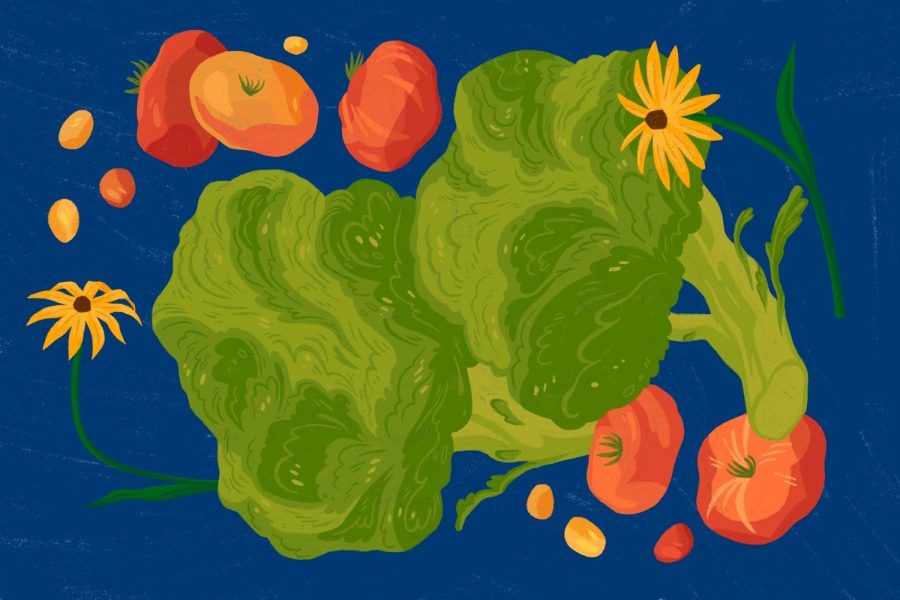Going Vegan 101
September 27, 2021
The vegan movement is rapidly spreading throughout the globe, with over 79 million members worldwide as of 2021. Here is what you need to know about going vegan – from benefits to local restaurant recommendations – so you too can support this cause.
A vegan diet focuses on plant-based nourishment. Vegans avoid consuming products such as eggs, milk, meat, seafood, and honey. The primary reason for going vegan is the belief that it is unethical to kill animals for the sole purpose of consuming them. However, the diet has many health and environmental benefits as well.
Going vegan can have a positive impact on physical and mental health. Cutting animal products out of your diet can lower your cholesterol levels, which lowers the risk of heart disease. Additionally, plant-based foods are full of phytochemicals, which aid the immune system, and tryptophan, which boosts serotonin levels and can help improve mental health (onegreenplanet.org).
Producing and processing animal products, especially meat, is extremely unsustainable. Not only does animal farming require a multitude of natural resources, it is also responsible for 14.5% of greenhouse gas emissions worldwide (ucdavis.edu). The animal farming industry is one of the leading global producers of nitrous oxide and methane – two gases which largely contribute to global warming. Livestock is responsible for more air pollution than all cars, planes, and other modes of transportation in the world combined (globalcitizen.org). Adopting a plant-based diet can reduce greenhouse gas emissions by decreasing the demand for animal products. Going vegan is a simple but effective way to advocate for an environmentally-friendly future.
Transitioning to a vegan diet may be a bit tricky at first. Starting small rather than immediately cutting all animal products out of your diet is a good way to take on veganism. Go at your own pace by making small changes such as pouring dairy-free milk in your morning coffee or participating in Meatless Mondays. Another way to make a vegan diet achievable and enjoyable is to buddy-up. Finding someone who is willing to go vegan with you will make it much easier for you to cook and eat plant-based foods.
Finding inspiration for homemade meals is a key component of committing to a vegan diet. Social media is what one might call the “hub” of veganism. It is a great place to find inspiration for healthy, delicious vegan meals. Many vegan social media influencers post recipes on Instagram, YouTube, and TikTok. Some all-time favorite vegan influencers include Halle Burns (@ballehurns on TikTok) and Lindsey Rempalski (@lindseyrem on YouTube).
If you’re dreading another night-in and cooking at home, fret not. South Bend offers plenty of vegan local flavor. Pinellia Vegan Asian Restaurant, located on the corner of Edison Road and Hickory Road, takes pride in its fully vegan menu. From wontons to pad thai to king oyster mushrooms, this small business offers fresh and nutritious options that will leave you wanting more. Purple Porch and the South Bend Farmer’s Market, both located near the downtown area, offer plenty of vegan pastries and unique vegan goodies as well.
Don’t forget your supplements. Going vegan means leaving out a few key nutrients out of your diet. While veganism is a fun lifestyle, it is important to remember to supplement these nutrients and to provide your body with everything that it needs to function properly. B12 is an essential vitamin that is only naturally available through animal products. Its supplement can be found at your local pharmacy, the Vitamin Shoppe, or even Fresh Thyme. Protein and fatty acids are also important nutrients to supplement. High levels of protein can be found in tofu, chickpeas and lentils, while fatty acids can be found in kale, spinach, and most nuts.
Going vegan is an exciting new challenge and it will gradually prove to be extremely rewarding. Go have fun; try out new recipes, tell your friends, and remember to buy those B12 supplements. The vegan world awaits.



